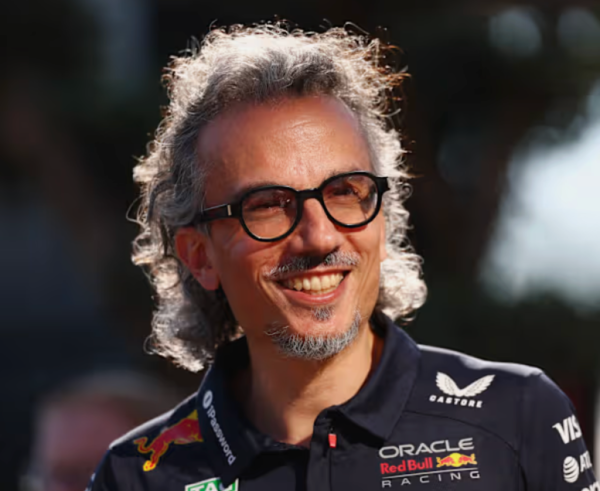
There’s a moment backstage at Web Summit when a member of the production crew — easily twice the size of Laurent Mekies — wraps a beefy arm around the Oracle Red Bull Racing CEO’s shoulder and steers him toward the soundboard to retrieve his phone for a selfie. Most executives leading 2,000-person organizations would bristle at the informality, even from a superfan. Mekies instead smiles, his demeanor unchanged as he accommodates the starstruck crew member.
It’s a small moment but perhaps a revealing one about Mekies who, just four months ago, became only the second person to lead Red Bull Racing in its 20-year history.
“The first feeling is one of being privileged, being honored, to suddenly be part of such an incredible team,” Mekies later tells me onstage in French-accented English. “This team has been winning more than anyone else in Formula One in the last two decades. And then suddenly you are part of it.”
“Suddenly” is not an overstatement. As widely reported, the wholly unexpected call came in July. Christian Horner, the outspoken executive who had led Red Bull since its entry into F1 in 2005, was out. Mekies, who had been running the team’s sister outfit, Racing Bulls, for just over a year, was tapped to step up.
Mekies was an improbable choice in some ways. Where Horner delights in the media spotlight and gamesmanship that defines F1 team principals, Mekies spent much of his career in the engineering trenches. His approach to winning reflects that technical background, too; he sees performance gains not just in aerodynamics and tire compounds, but in eliminating friction from workflows and processes.
That philosophy extends to the team’s partnerships. Take 1Password, the cybersecurity company whose CEO, David Faugno, sits beside Mekies and me on the Web Summit stage. Faugno took over his own iconic brand four months ago — the same week as Mekies.
The partnership between a cybersecurity company and an F1 team might seem like an odd fit. Security, after all, usually means friction. Passwords to check, systems to authenticate, workflows that slow people down. In F1, where thousandths of a second matter, that’s unacceptable.
But that’s exactly why Mekies sees 1Password as integral to Red Bull’s competitive edge. “Our people have to manage and log in and log out of complex systems — aerodynamics, vehicle dynamics at the track, back at the factory, at the simulator, in the wind tunnel . . . We go today faster in this seamless login and logout of our people from one system to another than what we were doing without the security level.”
Techcrunch event
San Francisco
|
October 13-15, 2026
It’s a small competitive advantage, but in F1, small advantages compound. “You are looking after the tiniest competitive advantage, one after the other,” Mekies notes. “Our tech genius, our people — they are challenging us every day about the noise that is somewhat unavoidable for a large team. With 1Password, we have this sort of answer where we reduce the noise, increase the time for the core business, and that’s fundamentally where the performance comes from.”
From engineer to CEO
At 48, Mekies has seen Formula 1 from nearly every angle. After studying at ESTACA, an engineering school in Paris, and Loughborough University in the U.K., he started in Formula 3 in 2000 before crossing into F1 with a British racing team called Arrows in 2001. He then joined Minardi, an Italian team, in 2003 as a race engineer. When Red Bull bought the struggling outfit and transformed it into Toro Rosso in 2006 — the idea was to create a junior team to develop young drivers like Max Verstappen for Red Bull Racing — Mekies was promoted to chief engineer.
Mekies stayed for eight years before moving on to become safety director at the Fédération Internationale de l’Automobile (FIA), the rulemaker for Formula 1 and other motorsport series worldwide. There, he reportedly championed the titanium safety device that’s mounted above the cockpit of Formula 1 cars to protect the driver’s head — the “halo” system. Then it was on to Ferrari as deputy race director, and five years later, back to Red Bull’s junior racing team (renamed Racing Bulls in 2024).
Mekies brings a breadth of experience to the role, in short. What he doesn’t bring — not yet, at least — is a lot of ego. When Verstappen won the 2025 Italian Grand Prix at Monza in September in what became the fastest race in F1 history, reporters asked Mekies about his contribution to the victory. His answer was self-effacing: “I have zero contribution.” When the reporters laughed, he added, “I’m not kidding.”
When I ask about that moment on stage at Web Summit, Mekies shrugs. “All we do as leaders is put our people in position to be able to express their talents. So it is very much their win.”
Mekies sees his role differently than his high-profile predecessor, in fact. He isn’t deliberately trying to “lead from behind.” Instead, he tells me onstage that he doesn’t “think the approach matters. I don’t think it’s leadership style. You will find every possible style in leadership. I think what matters in leadership is care for the people and a care-for-the-company culture.”
Indeed, while Mekies could certainly shower attention on his star driver (Mekies wants to retain him after all), he’s more focused on the collective. “Your first thoughts are for the 2,000 people back in the factories who have never given up on this season,” he says. “It takes a tremendous amount of energy, of company culture, to keep that motivation and that fighting spirit.”
Humility doesn’t mean playing it safe, by the way. The Monza win also validated a somewhat surprising decision: to keep pushing on the 2025 car rather than abandoning it for next year’s development. “We were not happy about where the car performance had been at the beginning of this year and up until the middle of this year,” Mekies tells me. “We decided to press on a bit more with 2025. We didn’t feel that we could simply turn the page and have wishful thinking about how everything will be better next year.”
It was a risky call. With completely new regulations coming in 2026 — new chassis rules, new power unit regulations — most teams had already shifted resources to next year’s car. But Mekies felt his team needed to understand what had gone wrong before they could move forward. “We felt we had to get to the bottom of what had not been working,” he says. “We perhaps pushed a bit more than some of the competition. And luckily, it gave us this turnaround in form.”
Now the team heads into winter with less development time than its rivals, “but with a lot more trust in our tools, in our methodologies, in our process,” Mekies says.
Driving forward
If Mekies’ 2025 turnaround was risky, 2026 represents something else: a “crazy adventure,” as Mekies describes how Red Bull is building its own power unit for the first time, in partnership with Ford. (It has relied on Honda-based engines since 2019.) “For Oracle Red Bull Racing, there are no other words to describe next year other than as a crazy challenge. That’s how big it is for us.”
For a sense of what the team is taking on, here’s how Mekies describes it on stage: “We are going to do our own power unit with the support from Ford, and we are going to compete against people that have been manufacturing Formula One engines for more than 90 years. It’s the sort of crazy level that only Red Bull can do. We’ve decided to create overnight facilities in the middle of a field in Milton Keynes (a large town about 50 miles northwest of London) in the U.K. from zero — get the building, get the dynos in (which are massive, sophisticated test rigs), hire 600 people, try to get them to work together, eventually try to get an engine and get it up to speed to reach the track.”
Can he promise Verstappen a championship-winning car next year? When I ask Mekies, he answers straightaway. “We would be silly to think that we just go in there and are going to be at the right level straight away. This is not going to happen,” he says. “But we take it the Red Bull way. We take it with all the high-risk, high-gain approach that we cherish.”
He has reason for optimism. Sitting third in this year’s F1 team standings, just behind Mercedes, Red Bull has a realistic shot at overtaking them for second place in the final three races of this year’s season. It’s a far cry from the dominance Red Bull enjoyed in recent years, but given how the season started, it would represent a major recovery.
Backstage before our conversation, as makeup artists powder us for the stage lights, I ask Mekies about the pressure of those final races. His answer is typically methodical.
“We always say that we take it race by race. So that’s what we are going to do in the next three races,” he tells me. “You want to turn up at the racetrack, put the car in the right window,” meaning the narrow range of conditions where a car performs optimally, “and fight for the win.”
It’s “incredibly difficult to fight at that level,” he continues, “but everyone in Milton Keynes has been doing such a tremendous job to turn the car around and to give us a competitive package for the end of the season.”
In the meantime, he insists that he’s not looking at the points tables or the what-ifs. “We don’t look at the numbers. We know there is a lot happening in the (F1 team standings), but we only look at it race by race.”
That’s the “only thing we do,” he says, describing Red Bull’s mission. “Chasing lap times.”
-
₹1.5 crore flat, but low-quality walls: Noida owner hammers pencil through wall, video sparks debate

-
India’s GDP likely grew 7.2% in Q2; consumption, private consumption key driver: Ind-Ra report

-
Delhi blast: All about Faridabad's Al-Falah University whose doctors were arrested for making bombs

-
SC bench to hear if litigant should first approach sessions court for anticipatory bail

-
Oneplus15 launch in India: Check release date, features, price, camera and battery
